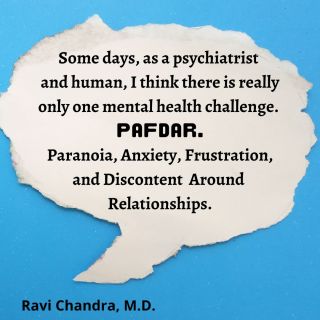Parental Alienation
Society Keeps the Score: Alienation, Cutoffs and Belonging
From black-and-white splits to ambivalence to logical families and belonging.
Updated October 12, 2024 Reviewed by Kaja Perina

Challenging relationships are, by definition, ambivalent. Not infrequently, they are ambivalent to the point of being split, dissociated, and even dismembering to the sense of self.
D.W. Winnicott’s classic paper “Hate in the Countertransference” underscored ambivalence in the therapeutic relationship, and included as example a range of reasons even mothers might hate their offspring. Hate can find its way into any loving relationship, and most relationships have at least some level of ambivalence.
Indeed, even a nation is an ambivalent notion, and our ongoing quest for a “more perfect union” comes with ambivalence or even hatred of the project itself. My recent 7-minute video-poem and film festival selection, “CitizenShip of Mixed Emotions” (appended below), illustrates my own hopes and ambivalences in loving a nation that harbors horrendous violence and hatred.
You might say that we are all in a state of disconnection, disrepair, disagreement, and dissociation, within ourselves and between us. Distressing people are sometimes quite powerful in our national “family” and complete cutoffs are impossible, though shifting our attention to reason, compassion, belonging and justice may be very helpful for the national psyche.
Treating Adults With Challenging Childhood Experiences: From Advice to Therapy

Young adults with difficult or traumatic childhood experiences are frequently ambivalent and looking for guidance. Ideally, depth psychotherapy can hold ambivalence, help build skills to comfort suffering, and help people come to their own decisions about how to manage their relationships with challenging family members.
But some crave more definitive understanding and advice. We have therapists online as disparate as Lori Gottlieb’s in her column “Dear Therapist: My Dad Is Trying to Force His Way Into My Life” (“go to therapy with him,” in part) to Patrick Teahan, a Boston therapist recently profiled in The New York Times who advises strict no-contact or cutoffs with offending family members, though he offers that these can sometimes be temporary until both sides are ready for understanding and repair. (Both articles in references.)
Teahan’s social media advocacy took off during the pandemic and he now has 900 members in his $69.99 a month community. He’s clearly found a group that craves his work – but others question his take. If this is the tip of the iceberg, though, then society may be the Titanic. "Society Keeps the Score" of family and cultural trauma. Cutoffs and strained relationships may be key to understanding both our loneliness epidemic and partisan divide and dissociation.
Some people do require temporary or complete “no-contact” or estrangement from family members. However, there’s usually a lot of room to be curious about the person presenting for therapy before advising this step. It’s also important to assess how relational damage impacts current emotional functioning. Cutoffs with one person may signal a habit of psychic cutoffs, isolations, resentments, contempts, social anxiety, and isolation that extends into other domains. Some people have a "core belief in a socially dangerous or antagonistic world," which predisposes to and amplifies psychic and actual cutoff. Teahan became popular precisely because of his social media presence. But social media has a predilection for hot takes and popular mass psychology, some of which might be beneficial, but which also might ultimately pan out to be less than satisfying.
Intergenerational and Cultural Trauma
Psychiatrists and therapists should always be aware of the harms that can come directly from parents, but also the impacts of intergenerational, cultural, and transhistorical trauma, where the “basic fault” (the dearth of attuned, loving relationships in early life) and relational dynamic takes its cue from the “compassion chasm” in society for marginalized people and groups. We should also understand the person on whom these issues land: their strengths, vulnerabilities, and all the possible ways they could grow to meet their predicament.
Many receive transmissions of trauma from their parents. Sometimes, insight into our parents’ or grandparents’ trauma can help “change the dance” of trauma between generations. The receptive child can be the “designated emoter” of the family, feeling and expressing emotions that other family members repress or suppress. The designated emoter can become a mindful partner to their family member’s suffering, and benefit from relationship management. A major transformative step is creating the “logical family” beyond the biological family. Teahan's community may be one of these. (For more on designated emoters, see my article and YouTube podcast in references titled "What Do We Feel When We Feel Close: The Dim Sum Dialogues." For more on logical families, see Armistead Maupin's book by the same name.)
Self-compassion and Communities That Can Soothe Distress
We all need other people to comfort us and soothe us when we’re in distress. Ideally, we get that “outside in” when we’re children, and through those experiences, learn better to comfort ourselves when we’re older. It’s usually more difficult for those with challenging or traumatic childhoods to comfort themselves in adulthood. Learning self-soothing techniques such as Mindful Self Compassion can help dramatically (part of the “inside out”), but I don’t think we ever grow out of the need for “outside in” comforting.
Emotional self-regulation is largely a myth. We all need to build relationships, communities, and even a nation and world that understand and soothes distress, from “parents just don’t understand” to the most horrific kinds of trauma that exist in this most central of human bonds. This is part of the “ancestral pattern shifting” that I wrote about in my last post.
Conclusion
Ultimately, there is a spectrum of ways adult children can deal with difficult families of origin. Therapists certainly should build a relationship with the patient, and compassionately ally with their vulnerabilities. They should use the relational field of the therapy (transference and countertransference) as ways to understand the inner world of the patient. And they should certainly help patients learn to comfort and soothe themselves, instead of simply acting out their distress.
When you “cut-off” – whom and what do you “cut-in”? What do you amplify as you change or limit contact with a family member? Can you find what the Buddhists call “your face before your grandparents were born?”
What is the undying truth of your humanity that has been veiled by your transit in time? Who are you beyond the womb and wound of your family experience?
Plato said, "Be kind, for everyone you meet is fighting a hard battle." Remember this, when you meet yourself in your own wounds.
CitizenShip of Mixed Emotions - an anti-racist videopoem short by Ravi Chandra, M.D.
© 2024 Ravi Chandra, M.D., D.F.A.P.A.
This article is a precis of two longer articles published at East Wind eZine, which are in references.
References
Winnicott D.W. Hate in the Countertransference. Originally published 1949, republished 1994 with an introduction by Glen Gabbard. Full article accessible at https://www.ncbi.nlm.nih.gov/pmc/articles/PMC3330380/pdf/348.pdf
Chandra R. MOSF 19.9: Society Keeps the Score: Family Trauma, Estrangement, Cutoffs, No-Contact, Alienation…and Post-Traumatic Growth (Part 1). East Wind eZine, August 8, 2024
Chandra R. MOSF 19.10: Society Keeps the Score (Part 2): From Psychic Cutoffs to Belonging. East Wind eZine, August 20, 2024
Barry E. Is Cutting Off Your Family Good Therapy? New York Times, July 14, 2024 (gift article)
Gottlieb L. Dear Therapist: My Dad Is Trying to Force His Way Into My Life, April 25, 2022 (gift article)
Chandra R. 6 Problems of “Instagram Therapy”. Psychology Today, June 26, 2019
Chandra R. What Do We Feel When We Feel Close? The Dim Sum Dialogues. Psychology Today, September 19, 2023
Chandra R. Why People Who Ghosted You May Get Back in Touch. Psychology Today, April 30, 2020
Four part series on trauma and healing:
Dr. Satsuki Ina on Japanese American Trauma and Healing (Psychology Today, September 26, 2023)
Cultivating Sense of Self to Cope With Trauma and Life (Psychology Today, October 3, 2023)
MOSF 18.9: On Creating Transitional Spaces to Heal Intergenerational Trauma (EAAPAAO Part 5) The conversation is available as an audio podcast with added music and intros and outros on SoundCloud and Apple Podcasts and on YouTube.) (October 7, 2023, with a version cross-posted at Psychology Today.)
MOSF 18.11: Abusive Power and Megalomania Perpetuate Racial, Cultural, Transhistorical, & Intergenerational Trauma (Part 2) (October 15, 2023, with a version crossposted at Psychology Today.) A podcast version of this talk (with added music and intros and outros by me) on Soundcloud and Apple Podcasts, as well as YouTube.




